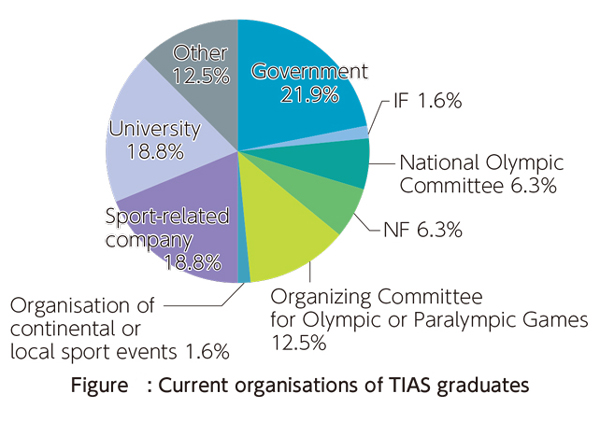Careers of Graduates(2017-2021)
A total of 95 graduates completed the programme from the first term to the fifth term. They are very active in the international sports community and now work at international sports organisations, overseas NFs, organizing committees for Olympic and Paralympic Games, sport-related companies, and educational institutions.
Figure shows the organisations to which the 64 of the 77 TIAS graduates from the first to fourth terms answering the survey belong (Source: Survey on TIAS Graduates conducted between 20 July and 4 August 2020). The most common answer was ‘government’, with 14 (21.9%) graduates at government agencies. Next was the 12 graduates (18.8%) at ‘sport-related private company’, and the 8 (12.5%) at ‘Organising Committee for Olympic and Paralympic Games’. On the other hand, 12 graduates (18.8%) belong to ‘university’, while 8 graduates (12.5%) answered ‘other (non-sport-related organisations)’.

According to another survey on careers conducted later, 12 graduates work at an ‘Organising Committee for Olympic and Paralympic Games’.
Graduates work at government agencies in countries including Indonesia, Malaysia, India, TanZania, Rwanda, Bangladesh, Myanmar, Samoa, and Portugal. Moreover, other graduates work at IPCs and IFs in Peru and Hungary and for NOCs and NPCs in Brazil, Cameroon, and Rwanda. Some graduates belong to the Organizing Committees for Tokyo 2020 and Beijing 2022. In Japan, Brazil, Guatemala, and Fiji, graduates work at their NFs, while some graduates work at sport-related companies in Japan, Singapore, India, and Sweden. There are graduates who belong to educational institutions such as universities in Japan, Sri Lanka, New Zealand, and Thailand. This data indicates that the TIAS graduates play an important role in sport-related fields all over the world.
In many cases, students who used to work for government agencies have returned to from whence they came after graduation and been promoted. Moreover, the number of graduates working for private companies associated with Organising Committees, NOCs, and NPCs has been increasing. This owes not only to the efforts of TIAS staff, but also to the reputation the students gained during their internships and the well-developed TIAS networks with national and international organisations.
Feedback from Graduates
Graduate from Guatemala (third batch)
“The words of the Brazilian writer Paulo Coelho “The world lies in the hands of those that have the courage to dream and who take the risk of living out their dreams”, express my experience as a TIAS student. I had an opportunity to benefit from the Sport for Tomorrow Programme, to engage in and acquire knowledge about Olympic and Paralympic studies, sport management, and sport for development and peace. Moreover, I did my internship with a famous Colombian foundation to foster youths and conducted a national-level survey to develop Olympism from theories to practice.
Since completing the programme, I have been working at the Autonomous Sports Confederation (CDAG- https://cdag.com.gt/ ) as a scientific research coordinator, and I’m in charge of coordinating scientific events in Guatemala and other countries, giving advice to research projects, and publicising studies on sport sciences. What I learnt at the TIAS is indispensable for my career development. Moreover, I’m in charge of reviewing innovation design and academic papers on education at the University of the Valley of Guatemala (UVG) and assumed the position of National Director for Physical Education, Sports, and Recreation at UVG. We are planning to conclude a mutual agreement on sharing of knowledge and training between Guatemala and Japan.”
Graduate from Samoa (fourth batch)
“I didn’t have the opportunity to participate in any workshop or project like the TIAS in my own country. After being admitted to the TIAS, I was able to take time and focus on my study, having a fruitful time. More than anything, professors and researchers in the field of sport came together and shared knowledge and practical experience on sport science and Olympic studies. I chose ‘sport for development’, because I looked for a model that exploits sports as a tool to reduce noncommunicable
diseases and violence against women in society, understands the importance of social cohesion, and supports the attainment of the sustainable development goals in our country.
Sport management is not exploited in sports organisations in Samoa. I believe that I can exploit knowledge I learnt to strengthen what the Government of Samoa and sports organisations propose for citizens. Now that I have completed the TIAS programme, I need to keep growing, keeping in mind the current situation of sports in Samoa, with a future vision. The Government of Samoa proposes the establishment of Ministry of Sports/Sports Facilities, but what is required is to foster grassroot
programmes, elite athletes, coaches, and sport academies. I hope that I can strengthen the relationships with TIAS2.0 together with other graduates, reinforce future plans for sports in Samoa, and foster future sport leaders, with the aim of promoting international cooperation and studies.”
Graduate from Indonesia (third batch)
“Currently, I work at a sports organisation in Indonesia. I learnt so many things in the TIAS programme from lecturers and those who work at international sports organisations, including the IOC that changed my way of thinking in such areas as sports tourism, communication, sport for development and peace, and Olympic values education. I’d like to contribute to the development of sports in Indonesia together with many friends I made in the programme.”
Graduate from Rwanda (third batch)
“Currently, I work as Under Secretary of the Ministry of Sports of Rwanda. I learnt at the TIAS that sports can be a driving force of social reform. There are not many academic studies on sport development in Rwanda, but I’d like to become involved in a new era of sports in the world and contribute to the exploitation of sports in social reforms.”
